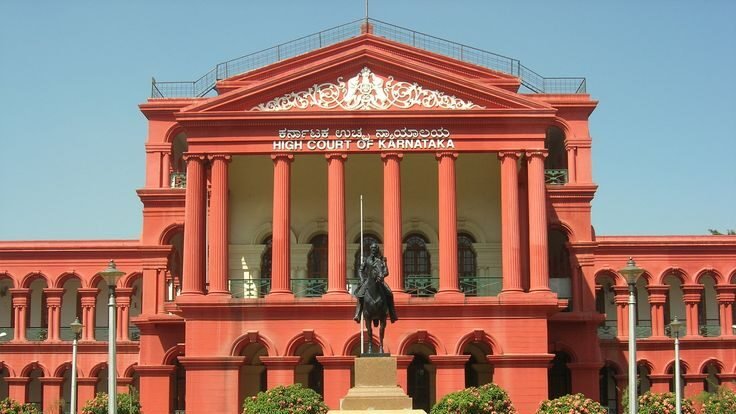When a lower court’s decision doesn’t align with your expectations, the legal system provides avenues for recourse. In Karnataka, the High Court of Karnataka, situated in the heart of Bengaluru’s legal district, serves as a vital appellate authority. For those considering an appeal to high court in civil cases or criminal matters, understanding the process is crucial. This comprehensive guide explores the nuances of filing appeals, including aspects like the limitation period for appeal in civil cases in high court and the process of filing a writ appeal in high court.
The judicial framework in Karnataka follows a hierarchical structure, beginning with district and taluk-level courts and culminating at the prestigious High Court. Based in Bengaluru, this institution wields both original and appellate jurisdiction throughout the state.
Understanding the time limit for filing writ appeal in high court and knowing when to pursue a second appeal in high court can be decisive factors in your legal proceedings. Whether you’re contesting a property verdict from Hubballi, challenging a business ruling from Belagavi, or appealing criminal charges from Bengaluru, the High Court provides a platform for judicial review under specified conditions.

When Can You Appeal to the Karnataka High Court?
Not all decisions from lower courts automatically qualify for appeal in the Karnataka High Court. Appeal rights are governed by specific statutes and vary based on case nature and order type. Understanding the court’s jurisdictional scope is essential, especially when considering what is writ appeal in high court.
Original Jurisdiction
This encompasses the court’s authority to hear cases initially. The Karnataka High Court exercises original jurisdiction in specific matters, including writ petitions, corporate cases, and select public interest litigations.
Appellate Jurisdiction
This refers to the court’s power to review lower court decisions. Most cases before the Karnataka High Court fall under this category.
Generally, you can file appeals against:
- Appealable Orders:
Specific interim orders from lower courts in both civil and criminal proceedings, as defined by relevant legislation like the Code of Civil Procedure (CPC) and the Code of Criminal Procedure (CrPC). - Final Judgments:
Definitive decisions issued by trial courts in civil and criminal matters. It’s worth noting that if you’re unsatisfied with the High Court’s decision, understanding the time limit for filing appeal in supreme court against high court order becomes crucial for further legal recourse.
Before proceeding with an appeal, it’s essential to determine if your case meets the legal criteria for appealability. For example, when considering an appeal to high court in civil cases, remember that not all interim orders qualify for direct appeal. Similarly, in criminal matters, appeal grounds and the appropriate appellate court are determined by offense severity and sentencing. At this crucial stage, consulting a High Court Lawyer in Bengaluru is vital to evaluate your case’s appeal potential.
Legal clarity, trusted results!
Types of Appeals Filed in Karnataka High Court
The Karnataka High Court addresses various appeals, primarily divided into civil and criminal categories, with specific limitation period for appeal in civil cases in high court.
Civil Appeals
Civil appeals challenge judgments and decrees from subordinate civil courts, including District Courts, in matters such as:
- Property Disputes:
Cases involving ownership rights, partition suits, inheritance claims, and easement issues. - Contracts:
Disagreements over contract breaches, specific performance demands, and other contractual matters. - Family Disputes:
Including divorce proceedings, child custody battles, maintenance claims, and matrimonial property division. - Injunctions and Stay Orders:
Appeals against orders granting or denying temporary or permanent injunctions. When filing a second appeal in high court in civil cases, you’re typically contesting the lower court’s factual findings or legal interpretations. This involves a thorough review of evidence and legal arguments presented earlier.
Criminal Appeals
Criminal appeals encompass challenges to criminal court decisions, including:
- Conviction Appeals: Contesting guilty verdicts from lower courts.
- Acquittal Appeals: State-initiated appeals against acquittal judgments.
- Sentence Appeals: Requests for sentence modification, either reduction or enhancement.
These appeals follow CrPC and IPC provisions, with specific attention to the time limit for filing writ appeal in high court.
Appeal from Magistrates Court and Sessions Court to Karnataka High Court
Karnataka’s criminal court hierarchy includes Magistrates Courts at the lower level and Sessions Courts at the district level. Understanding what is writ appeal in high court is crucial when navigating these appeal routes.
Appeal from Magistrates Court to High Court in Bengaluru
While Magistrate Court appeals typically go to Sessions Courts, certain cases qualify for direct writ appeal in high court. These situations include:
- Cases involving substantial sentences from the Magistrate.
- Challenges to specific Magistrate orders.
- Matters involving intricate legal questions.
Remember, if planning further appeals, knowing the time limit for filing appeal in supreme court against high court order is crucial for preserving your legal rights.
Cases involving traffic infractions, minor domestic disputes, and other petty criminal matters initially adjudicated by Magistrates may, under exceptional circumstances, reach the High Court through this appellate pathway. Legal practitioners in Bengaluru who specialize in handling such appeals possess comprehensive knowledge of the specific procedures and valid grounds for these appeals.
The Sessions Court serves as the primary trial court for major criminal offenses across districts including Bengaluru Urban, Rural, Tumkur, and surrounding areas. When considering the limitation period for appeal in civil cases in high court, it’s important to note that appeals challenging judgments and orders of a Sessions Court, whether they result in conviction or acquittal, are directly filed with the Karnataka High Court.
These appeals encompass serious criminal cases including murder, rape, dacoity, and other offenses punishable under the IPC. The High Court conducts a thorough examination of evidence, evaluates the Sessions Court’s findings, and reviews the legal procedures followed during the trial. Understanding the intricacies of “appeal from sessions court to high court Bengaluru” is vital for parties involved in such cases. Similarly, familiarity with the process for “appeal from magistrates court to high court in Karnataka” in applicable situations is equally crucial.
Secure your legal future !
Step-by-Step Process for Filing an Appeal in Karnataka High Court
Filing an appeal before the Karnataka High Court involves a structured procedure requiring careful attention to detail and strict adherence to specific rules and protocols. Here’s a comprehensive overview:
- Engage a Competent Advocate: For filing a writ appeal in high court or any other appeal, it’s crucial to engage an experienced advocate specializing in High Court appeals in Bengaluru. They can navigate the legal intricacies and ensure your appeal, whether it’s a second appeal in high court or a regular appeal, is presented effectively.
- Obtain Necessary Documents: Gather certified copies of the challenged judgment/order, lower court pleadings, evidence presented, and other relevant documentation.
- Draft the Appeal Petition: The appeal petition, whether it’s an appeal to high court in civil cases or criminal matters, must be meticulously drafted following the Bengaluru High Court’s prescribed format. It should clearly articulate the grounds for challenging the lower court’s decision.
- Pay the Requisite Court Fees: Specific court fees apply when filing appeals, varying based on case nature and amount involved. For civil cases, understanding the limitation period for appeal in civil cases in high court is essential to ensure timely filing.
- File the Appeal Petition: Submit the appeal petition, supporting documents, and court fee payment proof to the Karnataka High Court Registry within the prescribed time limit for filing writ appeal in high court.
- Serve Notice to the Respondent: After filing, ensure proper notice service to the opposing party informing them about the appeal proceedings.
- Prepare for Hearings: Post-admission of the appeal, prepare thoroughly for scheduled hearings where your advocate will present arguments while the respondent presents their counter-arguments.
Time limits are paramount in appeal filing. Missing deadlines can lead to appeal dismissal. Strict adherence to Bengaluru High Court’s local procedural norms regarding appeal petition format, copy requirements, and administrative protocols is essential.
Grounds for Appeal in Karnataka High Court
Understanding what is writ appeal in high court and other appeal types requires knowledge of valid grounds. The High Court reviews lower court decisions based on specific grounds:
- Errors in Law or Procedure: Challenges based on incorrect law interpretation, application, or procedural irregularities affecting case outcome.
- Errors in Fact-Finding: Contentions that lower court’s factual findings weren’t evidence-based or were perverse.
- Fresh Evidence: Exceptional cases where newly discovered significant evidence, unavailable earlier despite due diligence, could have influenced trial outcome.
- Violation of Natural Justice: Claims regarding violation of natural justice principles, particularly the right to fair hearing, during lower court proceedings.
Citing Karnataka-specific case laws and precedents is essential when presenting appeal grounds, as these establish the legal foundation and jurisprudence within the state’s jurisdiction.
What to Expect After Filing the Appeal
After submitting your appeal to the Karnataka High Court, whether it’s a writ appeal in high court or a second appeal in high court, several procedural stages follow:
- Scrutiny and Admission: The Registry conducts a thorough examination of your appeal petition to ensure compliance with procedural requirements and court rules. Upon satisfactory review, the appeal gains admission.
- Listing for Hearing: Based on the case nature, the appeal gets listed before either a Division Bench (comprising two judges) or a Single Judge. You can monitor the hearing schedules in Bengaluru High Court and access the role of cause list, court number, and online tracking through the official portal (typically linked to ecourts.gov.in).
- Records Preparation: The court calls for and compiles lower court proceeding records for the High Court’s examination.
- Arguments: During hearings, legal representatives present arguments supporting appeal grounds, followed by respondent’s counter-arguments.
- Judgment: Post hearing both parties, the High Court reserves its judgment, which may affirm, modify, or overturn the lower court’s decision.
The timeline & outcomes vary considerably based on case complexity and court workload. Parties should prepare for potentially extended proceedings.
Can You Appeal Against a Karnataka High Court Order?
While the High Court serves as a crucial appellate authority, particularly for appeal to high court in civil cases, its decisions aren’t always final. Understanding the time limit for filing appeal in supreme court against high court order becomes crucial when considering further legal recourse.
Such appeals typically proceed through a Special Leave Petition (SLP) under Article 136 of India’s Constitution. The Supreme Court exercises discretionary power in granting leave to appeal against any judgment, decree, determination, sentence, or order passed by any court or tribunal within India.
The SLP filing process demands expertise and usually involves substantial legal questions or matters of public significance. The limitation period for appeal in civil cases in high court and subsequent appeals to the Supreme Court must be strictly observed. Several landmark appeal cases from Karnataka have successfully reached and been decided by the Supreme Court, establishing important legal precedents.
Navigating legal challenges?
In Conclusion
Filing an appeal in the Karnataka High Court in Bengaluru, whether it’s a writ appeal in high court or a civil case appeal, demands a comprehensive grasp of legal protocols, including the time limit for filing writ appeal in high court and valid grounds for appeal. It’s essential to engage an experienced advocate well-versed in Bengaluru High Court procedures, particularly for handling second appeals in high court and understanding the limitation period for appeal in civil cases in high court.
This comprehensive guide aims to illuminate the path to justice through Karnataka’s highest judicial forum, incorporating crucial insights about appeal procedures. While this serves as a foundational resource, consulting legal professionals for case-specific guidance is strongly recommended. For broader understanding, explore Civil Litigation Karnataka services.


